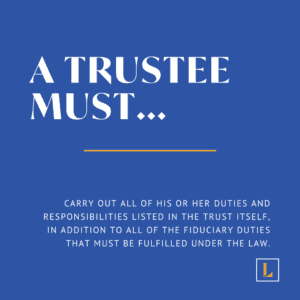What You Don’t Know About Being A Trustee Can Hurt You: Understanding What It Means To Be A Trustee
- Lagerlof, LLP I JUNE 2021
You may be flattered when your aging parents, or other relatives, ask you to serve as the Trustee of their estate. While it’s gratifying that they have such confidence in you, know what’s involved – and the potential risks – before you agree.
 As a Trustee, you are legally responsible to act in the best interest of the beneficiary – even if these decisions are unpopular with the rest of the family. You’ll need to remain on task, level-headed and responsible even when faced with potentially explosive family drama.
As a Trustee, you are legally responsible to act in the best interest of the beneficiary – even if these decisions are unpopular with the rest of the family. You’ll need to remain on task, level-headed and responsible even when faced with potentially explosive family drama.
The bottom line, what you don’t know about being a Trustee can hurt you, so only commit after you fully understand.
WHAT YOU NEED TO KNOW BEFORE YOU AGREE
- What your Trustee duties will be.
- The Trust terms and how to actually administer the Trust.
- Why your duties and obligations as a Trustee begin when the Trustor is still alive.
- How Trustee errors could put your personal assets, not just the Trust’s assets, at risk.
LET’S DEFINE “TRUSTEE”
The term “Trustee” is bantered around quite a bit and is sometimes used incorrectly. A Trustee is a person named in a Trust and given the power to manage the assets titled in the name of a Trust agreement. A Trustee can either be an individual or an institution, such as a bank or a trust company.
If a decedent, the “Trustor” or one who made the Trust, forms a proper estate plan and transfers his or her assets into a Trust, the assets put into the Trust can be passed on to the next generation without court involvement, totally privately and often less expensively.
The way this works is that the Trustee of the Trust works privately with us to transfer the assets of the trust to the beneficiaries or to continue to hold the assets in a continuing Trust.
THE ADMINISTRATION PROCESS CAN BE EXTREMELY COMPLEX
A Trustee must carry out all of his or her duties and responsibilities listed in the Trust itself, in addition to all of the fiduciary duties that must be fulfilled under the law. Some of these duties include providing statutory notice to beneficiaries and keeping them informed, gathering the decedent’s assets and carrying out the terms of the Trust with respect to those assets, notifying potential creditors, filing and paying taxes and more. Not fulfilling these duties can expose a Trustee to personal liability and financial hardship.
 SOME THINGS TO KEEP IN MIND BEFORE YOU AGREE TO BE A TRUSTEE
SOME THINGS TO KEEP IN MIND BEFORE YOU AGREE TO BE A TRUSTEE
First, ask if the Trustors have completed a comprehensive estate plan and whether they review it periodically. Reviews should happen every two to four years depending on law or personal changes.
A comprehensive estate plan should generally include: a Trust, Pour-Over Will, Durable Power of Attorney, Healthcare Initiative, any codicils or other documents that augment or amend the above documents, End of Life Plans (burial plans, locations, etc.) and the location of the assets. Without these basics, your job as a Trustee may prove very difficult.
Second, ask for a contact list of relevant family members, friends or others involved.
Third, have a clearly defined line of subsequent Trustees in the event you are unable to serve.
Lastly, obtain the names and contact information for relevant advisors such as estate attorney, financial planner, banker, CPA or other tax advisor and insurance agents.
You Might Need Help

Successor Trustees often lack the time, resources or knowledge to personally administer the Trust, and therefore may call upon legal, accounting and investment professionals with special training in trust administration. As a Trustee, you might want to consider obtaining professional advice to ensure that the terms of the Trust are properly carried out, protecting your own assets and making the process as understandable and stress-free as possible.
Remember, the responsibilities and duties that come along with Trust administration are great. Improper administration of a Trust can expose you to massive personal liability. Securing advice from an experienced attorney can help you protect the desires or the Trustor and yourself. If you have questions, contact our team today.
Lagerlof, LLP is the largest firm in Pasadena. With 113 years of experience satisfying clients, we are leading the market in strategic support. We are a team of trusted legal advisors on a mission to provide every client with clarity and understanding to succeed in a complex world. Lagerlof, LLP stands for innovation tempered with practicality, for thoroughness countered with common sense, and above all else, for impeccable integrity.

